An investment into private label is partly a bid to expand the unique brand that a store is, in essence, already providing to its community. Exclusive product offerings give customers a chance to take home with them the quality, the values and the healthy lifestyle that the store embodies for them to begin with.
“Private labels really appeal to the natural product customers who are looking to further support their local health food or vitamin store, but want to know that they are getting a quality product,” says Darcie Brault, marketing coordinator for FoodScience of Vermont, Essex Junction, VT. In other words, it’s a chance for shoppers to show you their love at the checkout counter, while at the same time going home with a trusted equivalent to their favorite national brands, or perhaps even something unique to your store. As we explore the whens, whats and whys of private label, Sunil Kohli, COO of Health Plus Inc., Chino, CA, has an important message to keep in mind: “Remember: it is NOT generic, it’s YOUR brand!”
The Private Label Boom
Consumers today all but expect to see private label brand offerings at their favorite stores. President of Vancouver, WA-based Matrix Health Products Steve Kravitz goes so far as to call private labeling ubiquitous. One reason is that where store brands may have once signaled “scrimp and save” to consumers, they now are associated with quality as well as value. “I think today there is less stigma associated with private label being an inferior brand. It has to certainly be a less expensive choice, but it does give people that other choice,” Kravitz says.
The private label bonanza, which has now seemingly become the status quo, was in part a trickle down phenomenon. As popular store brands such as Trader Joe’s and Whole Foods Market initiated and then expanded their private label offerings, many consumers began to see these products as equivalent to national brands, and to spend their health and wellness dollars on them more freely, explains Nadia Karim, project manager for NHK Laboratories, Inc., Santa Fe Springs, CA. “More importantly, innovative retailers have strategically positioned their store brands to not only be cheaper alternatives to national brands, but they’ve also made the products better than national brands in many instances,” she adds.
Perhaps the strongest factor in the success of private label, recently and historically, is a correlation with consumer moods and means. “The relationship between economic conditions and consumer decisions go hand in hand. We’ve been in a downturn for a while and private label has boomed,” says Dillon Lovelace, sales and marketing, Lily of the Desert, Denton, TX. This is because of the simple fact that “store brand” still means value in the minds of most shoppers. An important thing to realize in this context is that when fortunes change, new private label customers don’t tend to jump ship, according to Peter Sokoloski, private label manager for NOW Foods Private Label, Bloomingdale, IL. “If the consumer switches to a store brand, they’ll stick with it even when the economy rebounds.”
Standing in front of a shelf, with a national brand to the left and a private label brand to the right, the equivalency factor is what will sway many consumers toward the more competitively priced option. This is perhaps especially true in the health and wellness market where many believe a vitamin is a vitamin, a mineral is a mineral, and an amino acid is, well, you get the picture.
At its core, Kravitz argues, private labeling allows the consumer to buy a Cadillac at the cost of a Chevy. “How can this be possible? Well, you buy the Cadillac parts, and you assemble it like a Cadillac, but you 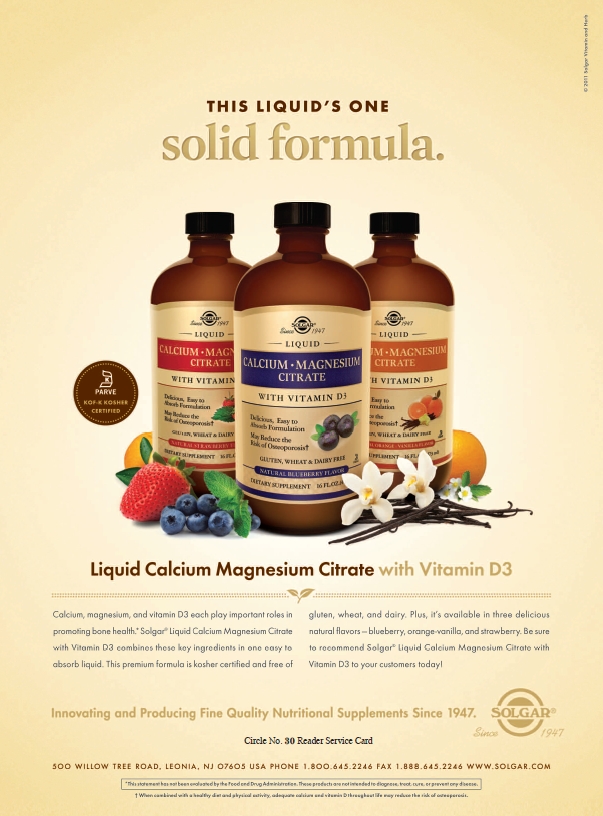 don’t have the advertising,” he says. This is the primary wedge that allows manufacturers and retailers to position private label brands for value. Other factors include a lack of distribution costs and other overhead.
don’t have the advertising,” he says. This is the primary wedge that allows manufacturers and retailers to position private label brands for value. Other factors include a lack of distribution costs and other overhead.
When a value-conscious consumer does opt for private label, they don’t often come away disappointed. “When he or she tries these items, it is almost always a satisfactory and pleasant experience,” says Scott Bennett, president of Golden Platter Foods, Newark, NJ.
Some point to additional influences on the recent flourishing of private label. For one, savvier shoppers are arming themselves with knowledge from newly available sources. Says Lovelace, “Consumers are making more educated decisions at the shelf with advances in technology, and are doing their homework prior to visiting the stores.” Another factor is that when faced with products they believe to be similarly effective, consumers tend to go with the one they know and trust. The glut of marketing materials, all promoting the positive attributes of many different products, is hard to make sense of as an individual shopper. “In which case, they want to rely on a reputable, known store or company to do the screening for them. They are expecting the store/retailer to act as a gatekeeper and provide a high-quality product,” says Val John Anderson, executive vice-president and director of sales and marketing for Mineral Resources International, Inc., Ogden, UT.
Topping it all off is the reality, understood by many consumers, that many private label brands are not only similar, but virtually identical to their nationally marketed counterparts. Indeed, “Many now know that the top major brands they buy from also manufacture for store brands,” says Kohli. Lauren Clardy, vice-president of marketing and business development for Randal Optimal Nutrients, Santa Rosa, CA, notes that this is true for the sphere of branded ingredients, as well. “With the advent of more private label companies offering proprietary branded materials in their stock formulas, consumers also see the trusted name they are looking for,” she says.
All of this amply illustrates why now is the time to go private label if you haven’t, or to expand or tweak current offerings to better serve your clientele. As we’ll see, not every retailer is positioned to do it, and private label isn’t necessarily an indispensable component of success. But there exists a strong correlation, and when it works, it tends to work well, with private label lines o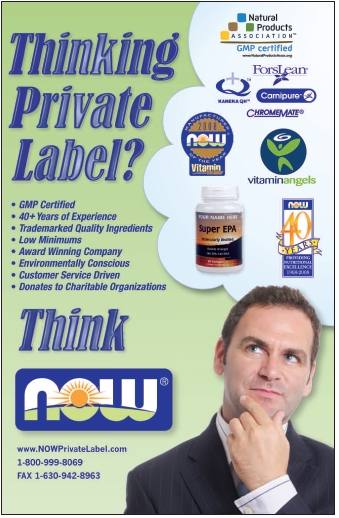 ften becoming best-sellers for independents and chain stores alike (see sidebars for examples of private label success, straight from independent retailers).
ften becoming best-sellers for independents and chain stores alike (see sidebars for examples of private label success, straight from independent retailers).
Hitting it big with private label can influence your profit margin indirectly as well as directly, by enhancing the strength of your store’s brand identity. “When a customer takes a private label dietary supplement daily, he or she is being reinforced with the store’s brand or logo, which hopefully establishes a positive brand experience,” notes Karim. Many customers will, in fact, view private label offerings as a chance to showcase their store loyalty, as well as to further their identification with the store. “Basically, if they trust the store or the employees, they’ll also trust a product with the store’s name on it,” says Sokoloski. “Remember, they can’t get your store brands down the street—they will come to you.”
Private label partnerships. The relationship that a retailer establishes with a private label manufacturer is an integral part of making it all work. Especially so today, when the advantages of partnering with a good contract manufacturer extend beyond product quality. It is a turnkey process in most cases, where all that’s left for a retailer to do is place the products on the shelf and market them to shoppers. This is not always the case. For example, when the situation and the pricing indicate it, some retailers will opt to have materials sent in bulk to be manufactured elsewhere. But it is the ability to get creative, and to get help in positioning their private label line for success that many retailers look for in a partnership.
Calling contract manufacturers not just suppliers but strategic partners, Karim talks of dialogue and involvement from the earliest stages of product development. From brainstorming a new product, to its production and distribution, many manufacturers today are there all the way, and are true partners in success. “Ultimately, the nature of the relationship between a private label customer and a contract manufacturer has evolved to become more sophisticated and includes myriad pre-distribution discussions and action plans,” says Karim.
P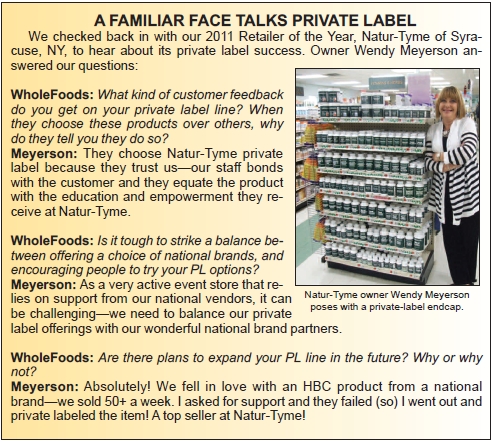 art of the benefit of being paired with a contract manufacturer is in gaining access to their knowledge and expertise. Lovelace notes manufacturers tend to have a finger on the pulse of things. “As a private label manufacturer, you have a good grasp on what is happening out there, and when opportunities arise, we may advise certain companies of these trends, allowing them to further research their options,” he says. At bottom, it’s about the retailer having access to quality help as they navigate the implementation of their private label line. Says Andrew Levine, president of Yellow Emperor, Eugene, OR, “The benefit of getting a private label company is that it’s like getting a support team.”
art of the benefit of being paired with a contract manufacturer is in gaining access to their knowledge and expertise. Lovelace notes manufacturers tend to have a finger on the pulse of things. “As a private label manufacturer, you have a good grasp on what is happening out there, and when opportunities arise, we may advise certain companies of these trends, allowing them to further research their options,” he says. At bottom, it’s about the retailer having access to quality help as they navigate the implementation of their private label line. Says Andrew Levine, president of Yellow Emperor, Eugene, OR, “The benefit of getting a private label company is that it’s like getting a support team.”
Diving In, Branching Out
Though private label was once the province of mainstay items like multivitamins, many retailers may wish to have products custom formulated to suit the needs of their customers, or to see if a novel approach might sell well, and many manufacturers offer services like these.
However, Levine is seeing this playful approach become somewhat curtailed recently. He attributes it to the unstable and complicated regulatory atmosphere, citing particularly Title 21 Code of Federal Regulations Part 111 pertaining to the manufacture of dietary supplements, which he believes creates some fear where there was innovation before. There is also Federal Trade Commission enforcement of label claim and marketing regulations to consider. “Everyone seems to be to some degree holding off from trying to put things out in the marketplace,” says Levine, while also citing cash flow issues and safety concerns as potential roadblocks to making the private label leap.
In general, retailers not already involved in private label may be wary of jumping in with the current economic atmosphere. It is difficult to be sure of the timing and the suitability of a private label effort for a given retail situation, and to understand all of the options available once the decision is made to try it. Even those that have seen some private label success can benefit from reflecting on the past and present of their line, with the goal of reinvigorating things for the future. The advice that will follow can go a long way toward these ends, and to begin with it may help to consider, at least within the context of private labeling, an age-old question.
The chicken or the egg? Which comes first, a strong private label line or success as a store? The notion that one breeds the other makes intuitive sense in both directions. For help, we can turn to the WholeFoods retailer survey of 2010. To begin  with, 37% of those surveyed carried at least some private label SKUs, and 8% carried products other than supplements like cosmetics and grocery items.
with, 37% of those surveyed carried at least some private label SKUs, and 8% carried products other than supplements like cosmetics and grocery items.
The survey also revealed a telling link between sales figures and private label supplement offerings. Those with a moderate amount of private label supplement SKUs, particularly between 24 and 50, had the highest yearly sales among those with private label. Stores with the highest numbers of private label SKUs averaged the lowest sales, suggesting that a predominance of private label is not a part of the large-scale retailer’s playbook. But, it is also notable that some private label was better than nothing, both in terms of sales and customers per day.
So, how best to interpret this type of information? Either a store markets a private a label line successfully because they are well-established, or a private label line helps propel a store with potential toward greater success. Experts say it works both ways. “Some new retailers start with a vanity label straight out of the gate, selecting a variety of top-selling products, such as multivitamins, heart-health formulas, ACE, etc. They then build upon that as they get to know what their regular customers like, and what their spending habits are,” says Kohli.
Conversely, Anderson believes private label is often a tool to further positive momentum and entrench a store’s success. “In most instances, private label can be something that can benefit a store after success has been achieved and can be a way for larger chains and stores to hold onto their customer base once they’ve been recognized as a leader,” he says.
Though it doesn’t have to be, private label is quite often a high-volume game. Therefore, truly leveraging private label into a successful situation is perhaps something only bigger stores can handle well, at least on a large scale, according to Jack Brown, vice-president of sales and marketing for Lily of the Desert. At any rate, private labeling isn’t a do-or-die proposition, according to Kravitz, beneficial as it might be. “Certainly you don’t have to have private label in your store to be wildly successful. Private label is another rung in the store shelf, literally and figuratively,” he says.
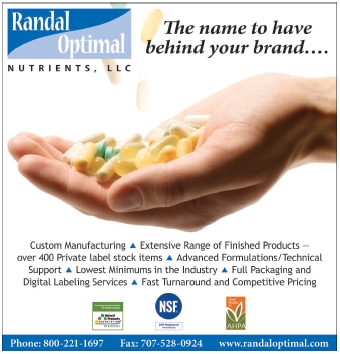 Be sure to check out the 34th Annual Natural Products Survey, in the upcoming December issue of WholeFoods, to see how private labelers fared in 2011.
Be sure to check out the 34th Annual Natural Products Survey, in the upcoming December issue of WholeFoods, to see how private labelers fared in 2011.
Poised for success. When an interest in private labeling is first established, it isn’t quite time to call in an order just yet. It remains to figure out what will work for you and your customers, if anything. If after consideration and efforts to study the potential of private label in your store, it appears that there will be little or no interest, then private label may not be the road best taken. Focus on what your store already does well, and enhance those aspects of your business, and perhaps private label will come to make more sense in the future.
If it appears private label may be worth a try, there are important questions to be asked, the most important of which is the direction in which to take the product line. First off, “Are your customers looking for something that isn’t currently available through the brands that you carry?” poses Brault. If there is an obvious demand for a type of product that can’t currently be found on your shelves, then what better way to bring it to your appreciative shoppers than wrapped in a label with your name on it?
If, on the other hand, you are starting from scratch when it comes to which products to private label, Kohli advocates the most obvious approach in saying, “Take a poll!” Across a calendar month, he suggests having customers write their top five most likely product choices, were you to offer them in a store brand. Extend this effort to social media as well, and when the results are in, you’ll have a good idea of where to start the discussion with a manufacturer.
Clardy thinks an observational approach can be of help, suggesting that retailers take an hour to watch customer behavior, noting which products they pick up and put back on the shelf before finally deciding what to take home. “Most importantly, look at your movement reports from your branded suppliers and distributors. Many suppliers will issue you a custom report of movement and what is selling in your store based on categories for a small fee,” she says.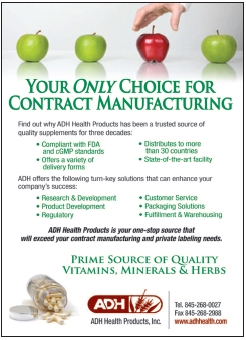
According to Kravitz, a simple sales-based selection method will bring good results. “What I tell people is to go with a category that’s hot in your store, that’s up and coming, or a continual sale that’s always selling,” he says. Once this top category is determined, he says to then whittle it down to the two or three hottest SKUs, and use them as a jumping off point.
Aside from direct feedback, the other half of the private label equation concerns self-knowledge as a retailer. For instance, Kravitz explains that demographics often determine the balance of a private label line. Take the common case of a store on or near a college campus, 75% of whose customers may be under 25. That store’s supplement mix will reflect this demographic strongly, with a focus on sports nutrition and perhaps supplements for mental energy and focus for studying. A retailer with a retirement community next door, on the other hand, will of course have a private label line that looks very different.
Trends in the lifestyle choices of your customers should also be taken into consideration. “If your store caters to a clientele that buys only vegetarian and vegan products, create a private label brand that leverages those product attributes to engender goodwill with your store brand,” Karim says. Something that can pay overall dividends to a private label line these days is the presence of certified organic products, according to Levine. He calls the organic trend an exciting opportunity, and one that can bring added value to your store brand. It is also a good idea to keep mainstays like multivitamins as a central fixture of a private label supplement line. These items are popular because of their convenience, and some customers may enjoy choosing your brand, especially if it offers better value.
The most fundamental thing is to work closely with your manufacturer, and to think it through well. “It is important for both retailers and manufacturers to understand the consumer that is being targeted, and to optimize their private label business by having a clearly thought-through strategy for going to market with private label brands,” says Bennett. To keep things simple, Anderson presents an easy-to-remember mantra to repeat throughout the private labeling process: “Know your customer base a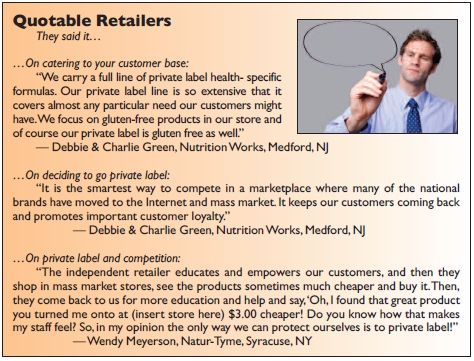 nd their expectations. Know yourself and your expertise.”
nd their expectations. Know yourself and your expertise.”
Get it started. For the most part, Sokoloski believes that private label is the place to stick to what’s tried and true. “Generally a private label line isn’t the forum for innovative formulas; you’re looking to provide an excellent product at a good price,” he says. But if this is the direction you choose to take, perhaps because you see an unmet need among your customers, then it is important to find a manufacturer with the ability to follow through on what you want.
Retailers can indeed be innovative with their lines, and the nice part is that they don’t have to have staff devoted to R&D, explains Levine. “They just have to have a notion of what they think would be a cool product, because they are aware of what their demographics might be interested in, and they’re willing to roll the dice, put a pilot batch of material out there and try it,” he says.
Though a retailer might not know exactly which ingredients will best serve a product, the ideas they do have can be factored in. “They may know that they want to have a certain ingredient that has marketing caché, that has been known to do certain things, and they want to see that in the product but they don’t know the rest of the picture. We can do the footwork product development in terms of the formula,” says Levine. He points out that formulation is not only limited to supplements, but also to fortified products such as soft drinks and other grocery items. A private label company may also design a product, and then leave the actual manufacturing to another firm.
Low minimums are a sticking point for many small retailers looking to enter private label. Short trial runs may benefit some retailers at first, but price margins may be a concern and the number of options may be limited when compared with larger scale efforts. Retailers considering liquid concentrates should know that “the stronger things get, the more expensive they get,” according to Levine. The price point, therefore, of a highly concentrated liquid product may not be suitable for your customers.
No matter the product, one thing all retailers will want from their manufacturer is the peace of mind that only a trustworthy vendor can bestow. “I would suggest always sourcing that item from a company that is GMP certified,” says Dave Chambers, national sales manager for Trace Minerals Research, Roy, UT.
As has been described, today’s private label manufacturers are true partners, and they’ll work with you during the product selection process. What comes next is the difficult task of positioning your store brand for success, and that involves the actual label people will see on the products themselves. “Traditionally in the old days, when a lot of the private labeling came from food and from canned food, really the label was pretty boring,” says Kravitz.
Today it is a different story, from the label to the packaging itself. “We’re going to start with dressing up the package, using a different color bottle, a different style bottle, a different color cap,” says Kravitz, explaining that the end goal is to achieve “a little more shelf pizzazz.” These may seem like superficial concerns, but it’s all about helping the products to stand out, and in the process striking a chord for private label. “These are all things that can help not only differentiate the product on the shelf to the consumers, but to show consumers in general that private label doesn’t have to be bland,” Kravitz says.
Hands-on label design is a growing trend, as evidenced by the new program that will soon be released by Brault’s company, one that will allow retailers to customize their labels online. “They can pick their template and change anything from fonts to the colors and placements of their logo,” she says. This type of access allows for experimentation and removes the need to pay a graphic designer, according to Brault, adding that company graphic designers will be available as back-up with this program.
Beyond aesthetic concerns lies the important question of how the label reads, and how it presents the products at a glance. Consumers today want health foods and supplements to relate directly to their health concerns, so condition-specific names on the principal display panel are key, according to Clardy. She says that people will buy based on what will make them feel better, so seeing “Joint Health” on a label will elicit more of a response than “Glycosaminoglycans” might.
How all the products in a line tie together is a matter that cannot be passed over, as it speaks to the message of your store’s brand as a whole. “A unifying theme definitely helps in establishing brand identity,” says Karim, adding, “Just because it’s a private label brand doesn’t mean all the normal branding strategies used for national brands are not applicable.”
In the store. The significance of branding and positioning applies once private label products hit the store, as well. Putting the products in the wrong place, for instance, can allow consumers to pass them over, and can therefore be a costly mistake. “It helps to put your product next to the higher priced brand name product so the consumer can see that they are making a good decision,” says Brault.
The topic of pricing private label is not an entirely settled one for every retailer. This aspect of your line’s positioning should reflect the personality of your store. “It really depends on the retailer and their marketing strategy already in place as to how the consumer views their private label lines. If they are a discount store, to try and be ‘premium’ in the private label line would probably fail,” Brown says.
It’s a matter of catering to your strengths as a retailer, according to Sokoloski. If it has been decided to primarily offer basic “commodity” options (multivitamins, calcium, etc.), then a value-based approach is correct. This goes as well for retailers whose profit margin targets are low or are flexible. “But retailers that offer more information, marketing or premium-type services should be able to charge a higher price point due to their higher incurred costs,” Sokoloski says. “Both approaches have their place in the market.”
Part of the reason many retailers dive into private label in earnest is to level the playing field. Competing with discount chains and online stores is difficult, but a successful private label line may be your ace in the hole. “They can’t try and price match a brand that only exists in your store. Basically, you are eliminating the competition,” says Chambers.
Even if everything has been done correctly, and the best private label line in the world is resting on your shelves, it is still crucial to foster awareness among your customers and the community at large. For stores that pride themselves on the expert nutritional advice their staff can offer, it is important to leverage your reputation to the benefit of your private label effort. “Tie your staff expertise back to your advertising. Build the credibility of your store, its level of knowledge and its integrity,” says Clardy. There are numerous other promotional routes to take, from private label product giveaways to discounts at community or charity events, according to Kohli. “Take the time to hire a promotional writer to write your brochure/flyer that describes the heart, soul and personality that the brand represents,” he says.
Once success in private label has been established, it is an obvious next step to expand one’s offerings. But beware of overextending the line to the point that it creates dead inventory, or allowing private label to wear out its welcome with your customers. Kravitz believes that too much private label can hurt a store, stating, “I think you’re there to sell a national brand, you’re there to offer service and you’re there to offer selection.” If several quality national brands are on offer in a given product segment along with your store brand, then there is enough opportunity to choose for your customers.
But, says Kravitz, “If someone walks in the store and only sees your name on every single bottle, on every single SKU, I think that can be a turn off.” While it’s a good thing to have confidence in your product offerings, Kravitz emphasizes that in this age of e-commerce, physical retailers exist to offer service, and that includes offering an adequate range of brands. WF
Published in WholeFoods Magazine, October 2011









